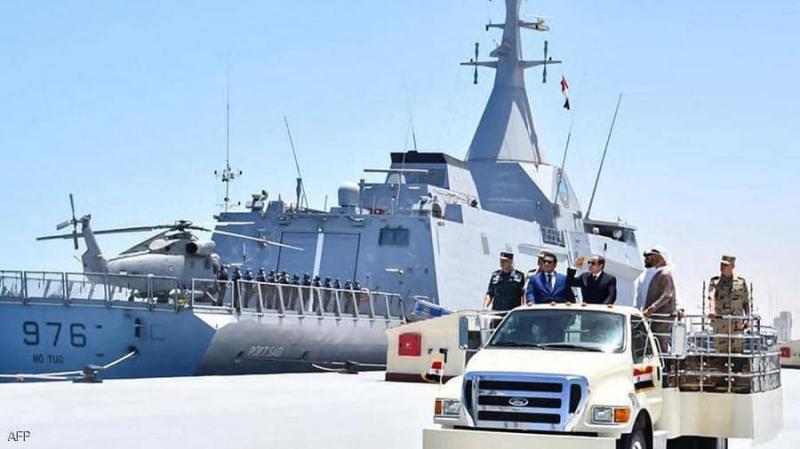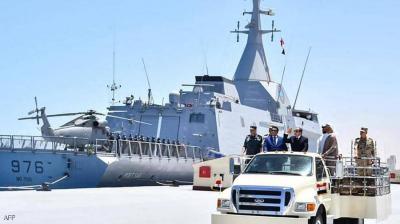Energy and national security experts have revealed that one of the strategic goals of the July 3 naval base, which is the largest in the Middle East, is to protect Egypt's natural resources of oil and natural gas in that region along the Mediterranean coast. Egyptian President Abdel Fattah el-Sisi confirmed days ago, during the signing of the inauguration document for the July 3 base, that one of its main objectives is to "secure Egypt's economic capabilities." This aligns with what Admiral Ahmed Khaled Hassan, Commander of the Egyptian Navy, stated at the same event, highlighting that the Egyptian state is placing significant emphasis on the sea after "God has blessed us with its bounties." What is the significance of this?
Experts indicated that the base's location in the west, near the Libyan border, makes it close to the newly discovered natural gas fields along the Mediterranean coast, adding to three other naval bases near Egypt's "Zohr" gas field in the eastern Mediterranean. Last week, President el-Sisi inaugurated the July 3 naval base in the Jargoub area, about 70 kilometers from the Libyan border.
American Research
Petroleum and energy engineering professor Ramadan Abu Alaa stated that hydrocarbon discoveries in the Mediterranean do not cease. According to research conducted by the U.S. Geological Survey, approximately 83,000 square kilometers harbor about 220 trillion cubic feet of natural gas in this promising area. Abu Alaa explained, in an interview with Sky News Arabia, that the area where quantities of gas and oil have been confirmed lies south of the Cypriot arch, and potential reserves are known to specialists, covering economic zones of several countries, including Cyprus, Egypt, Palestine, Israel, Lebanon, and Syria.
Before announcing the establishment of the naval base on the Mediterranean coast near Libya, Egypt had already offered many tenders for the exploration of natural gas and oil in the Mediterranean and Red Seas, as additional oil discoveries emerged in Egypt’s Western Desert, near the site of the new base.
Promising Discoveries
The head of the Arab Center for Strategic Studies and Development, Samir Ragab, noted that the area above the site of the new naval base in Jargoub is expected to see promising future gas and oil discoveries. He emphasized the necessity of securing and protecting it early, as it represents an additional wealth for Egypt following the gas discoveries in the eastern Mediterranean, notably the "Zohr" field.
Ragab explained in an interview with Sky News Arabia that the primary tasks of the base, apart from securing new oil discoveries, include safeguarding the western borders of the state against arms or goods smuggling by sea, as well as combating illegal immigration. He pointed out that the Egyptian Armed Forces’ recent maneuver "Qader 2021," which showcased integration of weapons used by various branches of the armed forces, underscores Egypt's capability to protect its security on land, sea, and air, especially along the western border towards Libya, which is still suffering from regional interventions and the spread of terrorist militias and mercenaries in some areas.
The new July 3 naval base's significance is further amplified by its proximity to the Libyan territory, which is rich in oil and gas, known as the "Oil Crescent."
Energy Conflict
Military and strategic expert Major General Mohamed Salama Al-Johari stated that current and future gas and oil discoveries are witnessing ongoing regional disputes, emphasizing the necessity of a strong military presence to secure economic rights at sea, particularly when this presence is near discovery areas. Al-Johari pointed out in an interview with Sky News Arabia that there have been ongoing disputes for years in the eastern Mediterranean over discovered gas wells, with each party claiming they fall within its economic waters. Amid the "energy conflict" in the eastern Mediterranean, no party has resolved the crisis in its favor.
The military expert added that possessing military capabilities and power does not imply threatening others but rather provides a fortress and support for Egyptian and Arab national security and direct protection for the discovered and existing resources along the Mediterranean coast, whether they are Egyptian, Arab, or the resources of allied countries with strategic ties to Egypt.
The Egyptian state aims to achieve self-sufficiency in petroleum products within the next two years. The confirmed natural gas reserves in the "Zohr" field are estimated to be about 30 trillion cubic feet, according to Egyptian government reports, with a production rate of 2.7 billion cubic feet of gas daily, enabling Egypt to achieve self-sufficiency in natural gas and to export quantities of it abroad.




